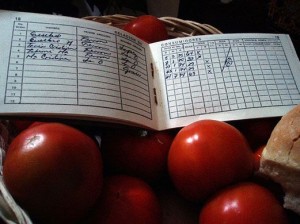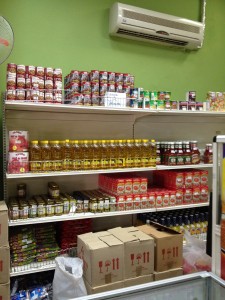Food Rationing – Time for a Change
April 9, 2012 by cahunt
In the Revolution’s early years, the government employed a rationing system in order to ensure Cuban families with equal access to scarce food items. Beginning in 1962, each family was supplied with a Libreta de Abastecimiento (“Supplies booklet”), a food rationing card which gave them access to a basket of basic foods such as rice, beans, eggs, sugar, cooking oil, poultry, and occasionally meat. At one point, the basic food basket also included industrial products such as light bulbs and fuels but stopped selling them when Soviet imports ceased. The contents of the basic goods basket has fluctuated throughout the years depending on Cuba’s trade relations with the U.S. and the Soviet Union (obviously until its collapse, which severely impacted Cuba’s foodstuffs). All products sold at state stores are sold at subsidized prices which have remained fairly stable since their inception. Though prices are low, each family is only given one libreta per year. This may or may not be enough depending of the number of family members and their ages, as rationed foods differ according to age.
We made an effort to enter a few of these rationing supermarkets during our stay in Havana, though we stood out significantly as we were often the only non-Cubans there. Surprisingly, there were a few American brands on the shelves such as Pringles, Coca-Cola, and Red Bull which must have been imported from either Europe or Mexico. There are shelves stocked with canned foods, crackers, and biscuit/cookie-type snacks we frequently saw around Cuba. One of the stores had a meat section, where a woman told us she could purchase chicken for two CUC’s.
Ultimately, these stores are limited. There is a limited supply, limited options from which to choose, and the foods – the majority of which are in canned, powdered, or packaged – are limited in their nutritional value. In traditional Cuban fashion, the state stores supply an overwhelming amount of alcohol. When I told a woman we met that I thought it strange to have so much alcohol and so little food, she laughed. Still, I couldn’t help being frustrated at seeing an entire wall stocked with Havana Club rum while the rest of the store’s shelves seemed somewhat deficient.
The food in rationing stores is not sufficient to satisfy the nutritional needs of a Cuban household and citizens must supplement the food they receive from their libretas with fresh produce sold outside in agromercados and other street vendors. Though there are many Cubans who buy solely from the state stores, people have had to integrate produce from both private and state owned markets out of necessity for a larger quantity and improved nutritional value in their food. Some people we talked to spoke of the state distribution stores as a thing of the past, a government subsidy that is nice to have but falls short of adequacy. Raul Castro’s proposal to abolish the libreta has already been shut down, but the possibility of food rationing becoming subsidized based on individual cases is highly likely considering the increasingly capitalist economic reforms.
Leave a Reply
You must be logged in to post a comment.




